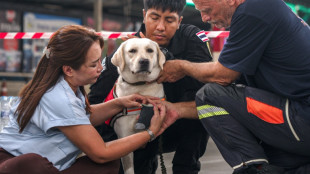
-
 Heat humble Celtics for sixth straight win, Thunder roll on
Heat humble Celtics for sixth straight win, Thunder roll on
-
Trump escalates trade war with sweeping global tariffs
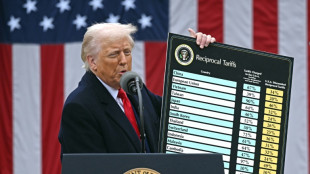
-
 Japan says US tariffs 'extremely regrettable', may break WTO rules
Japan says US tariffs 'extremely regrettable', may break WTO rules
-
South Koreans anxious, angry as court to rule on impeached president

-
 Juve at in-form Roma with Champions League in the balance
Juve at in-form Roma with Champions League in the balance
-
Injuries put undermanned Bayern's title bid to the test

-
 Ovechkin scores 892nd goal -- three away from Gretzky's NHL record
Ovechkin scores 892nd goal -- three away from Gretzky's NHL record
-
Australian former rugby star Petaia signs for NFL's Chargers

-
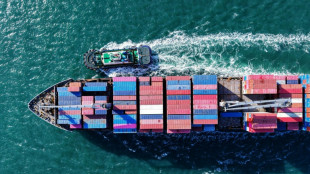 China says opposes new US tariffs, vows 'countermeasures'
China says opposes new US tariffs, vows 'countermeasures'
-
Athletics world watching as 'Grand Slam Track' prepares for launch

-
 Heat humble Celtics for sixth straight win, Cavs top Knicks
Heat humble Celtics for sixth straight win, Cavs top Knicks
-
Quake-hit Myanmar's junta chief to head to Bangkok summit
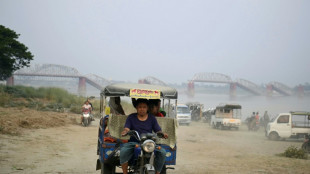
-
 New Spielberg, Nolan films teased at CinemaCon
New Spielberg, Nolan films teased at CinemaCon
-
Shaken NATO allies to meet Trump's top diplomat

-
 Israel's Netanyahu arrives in Hungary, defying ICC warrant
Israel's Netanyahu arrives in Hungary, defying ICC warrant
-
Shiny and deadly, unexploded munitions a threat to Gaza children
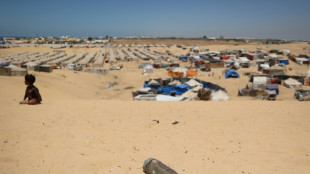
-
 Stocks tank, havens rally as Trump tariffs fan trade war
Stocks tank, havens rally as Trump tariffs fan trade war
-
Altomare hangs on to tie defending champ Korda at LPGA Match Play

-
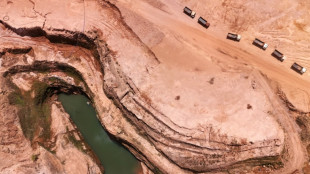 Paraguay gold rush leaves tea producers bitter
Paraguay gold rush leaves tea producers bitter
-
Health concerns swirl as Bolivian city drowns in rubbish

-
 Syria says deadly Israeli strikes a 'blatant violation'
Syria says deadly Israeli strikes a 'blatant violation'
-
Financial markets tumble after Trump tariff announcement
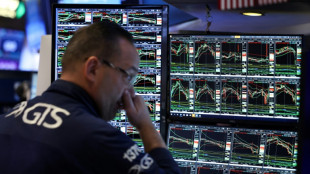
-
 Starbucks faces new hot spill lawsuits weeks after $50mn ruling
Starbucks faces new hot spill lawsuits weeks after $50mn ruling
-
Europe riled, but plans cool-headed response to Trump's tariffs

-
 'Shenmue' voted most influential video game ever in UK poll
'Shenmue' voted most influential video game ever in UK poll
-
New coal capacity hit 20-year low in 2024: report
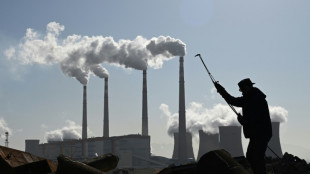
-
 Revealed: Why monkeys are better at yodelling than humans
Revealed: Why monkeys are better at yodelling than humans
-
Key details on Trump's market-shaking tariffs
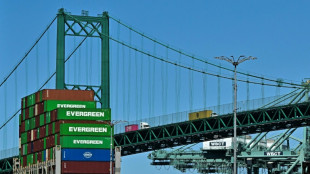
-
 'A little tough love': Top quotes from Trump tariff talk
'A little tough love': Top quotes from Trump tariff talk
-
US business groups voice dismay at Trump's new tariffs
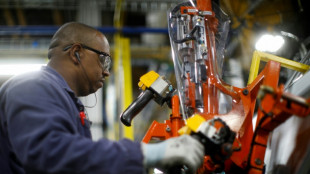
-
 Grealish dedicates Man City goal to late brother
Grealish dedicates Man City goal to late brother
-
US tariffs take aim everywhere, including uninhabited islands

-
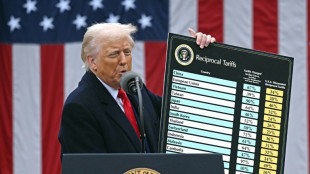 Trump sparks trade war with sweeping global tariffs
Trump sparks trade war with sweeping global tariffs
-
Israeli strikes hit Damascus, central Syria; monitor says 4 dead

-
 Slot 'hates' offside rule that gave Liverpool win over Everton
Slot 'hates' offside rule that gave Liverpool win over Everton
-
US stocks end up, but volatility ahead after latest Trump tariffs

-
 Barca oust Atletico to set up Clasico Copa del Rey final
Barca oust Atletico to set up Clasico Copa del Rey final
-
Mourinho grabs Galatasaray coach's face after losing Istanbul derby

-
 Grealish strikes early as Man City move up to fourth in Premier League
Grealish strikes early as Man City move up to fourth in Premier League
-
Reims edge out fourth-tier Cannes to set up PSG French Cup final

-
 Liverpool beat Everton as title looms, Man City win without Haaland
Liverpool beat Everton as title looms, Man City win without Haaland
-
Jota wins bad-tempered derby as Liverpool move 12 points clear

-
 Inter and Milan level in derby Italian Cup semi
Inter and Milan level in derby Italian Cup semi
-
Stuttgart beat Leipzig to reach German Cup final

-
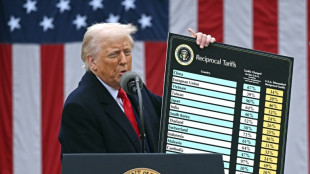 Trump unveils sweeping global tariffs
Trump unveils sweeping global tariffs
-
Italian director Nanni Moretti in hospital after heart attack: media

-
 LIV Golf stars playing at Doral with Masters on their minds
LIV Golf stars playing at Doral with Masters on their minds
-
Trump unveils sweeping 'Liberation Day' tariffs

-
 Most deadly 2024 hurricane names retired from use: UN agency
Most deadly 2024 hurricane names retired from use: UN agency
-
Boeing chief reports progress to Senate panel after 'serious missteps'


Can factory chicken really help save the climate?
Stephane Dahirel doesn't exactly say eat chicken and save the planet, but that is what he's hinting at as he opens a shed door on his intensive farm in Brittany, western France.
The 30,000 chickens inside will more than triple in size in less than a month and their meat will have a low carbon footprint.
"The objective is to produce the best meat possible, in the least amount of time, with the least amount of food," Dahirel said.
The two million snow-white chickens he produces every year -- bred mostly for McDonald's nuggets -- will reach their slaughter weight in less than half the time it takes on a traditional farm.
At 20 days they already weigh one kilo (two pounds) -- 20 times heavier than at birth. By the time they are slaughtered at 45 days, they will weigh over three kilos.
Chicken has the smallest carbon footprint of any meat, according to the UN's Food and Agricultural Organization (FAO), less than half the two kilos of CO2 produced for a kilo of pork, and 30 times less than that of beef.
While cows produce a lot of planet-warming methane, chickens emit very little. As much, in fact, as rice, the FAO says, or even less if they are intensively farmed.
Dahirel insisted that intensive farming is "the most efficient and rational system" for producing meat "from an economical and ecological perspective".
- Animal welfare -
But there are big drawbacks too. Despite the low emissions he claims for his chickens, producing the grain to feed them requires large amounts of land, synthetic fertilisers and pesticides.
All have effects on biodiversity and water quality. Indeed green algae blooms on beaches in Dahirel's native Brittany -- partly caused by intensive pork, poultry and dairy production -- has caused an environmental outcry and been linked to several deaths.
Intensive farming is also in the dock on animal well-being.
Dahirel raises 20 chickens per square metre (20 chickens per 10 square feet), which are kept on a litter where droppings are absorbed by wood shavings and buckwheat hulls.
Sick or abnormal chickens are killed to avoid further suffering and because the automated slaughterhouse requires a homogenous product.
"They are not robots of course, but we're looking for homogeneity," the farmer said from his veranda overlooking his three sheds, which are covered in solar panels.
- We must 'eat less meat' -
Chickens may be an optimal animal protein for carbon emissions, but not necessarily for nature, experts say.
"If we think only in terms of CO2 emissions per kilo of meat, we'd all start eating chicken. But thinking that's the solution would be a massive mistake," said Pierre-Marie Aubert, of France's IDDRI sustainable development think tank.
"If you only think in terms of carbon, a heap of things would backfire on us in the long run," he added.
Aubert said there had been a "crazy" rise in consumption of chicken in recent years, making it one of the most widely consumed meats in the world, with none of the religious and cultural taboos associated with pork and beef.
The world has become so focused on methane emissions from ruminants like cattle and sheep "that many people think substituting beef with chicken is enough, but really, we need to reduce all meat consumption," said Lucile Rogissart, of the Institute for Climate Economics (I4CE).
J.Oliveira--AMWN

